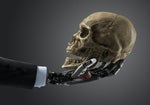Q&A: TIAA's CIO touts top AI projects, details worker skills needed now

Artificial intelligence (AI) is already having a significant effect on businesses and organizations across a variety of industries, even as many businesses are still just kicking the tires on the technology.
Those that have fully adopted AI claim a 35% increase in innovation and a 33% increase in sustainability over the past three years, according to research firm IDC. Customer and employee retention has also been reported as improving by 32% after investing in AI.







